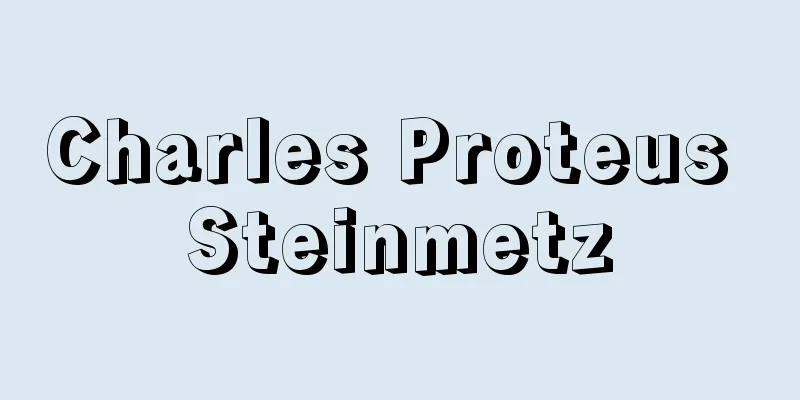Charles Proteus Steinmetz

|
German-born American electrical engineer. While studying extensively and intensively at the University of Breslau, he was pursued by the authorities for participating in the socialist movement, including serving as the shadow editor of the socialist newspaper "Voice of the People," and traveled to the United States in 1889 via Switzerland. He changed his name there, but his original name was Karl August Rudolf Steinmetz. After working at the factory of Rudolf Eickemeyer (1831-1895), who manufactured electrical equipment, he became an advisor to the General Electric Company in 1893. At the Schenectady research laboratory, he obtained 195 patents for electrical equipment designs, mercury lamps, lightning arresters, AC high-voltage transmission equipment, etc., and also wrote many papers, playing a decisive role in the establishment of AC electrical technology. In particular, his theoretical research, such as the discovery of the hysteresis phenomenon, the theoretical analysis of transient phenomena, and the establishment of a method of calculating three-phase AC circuits using a symbolic method that introduced complex numbers, led to the establishment of electrical engineering. In 1902, he also took up a professorship at Union College. Of his ten books, "Theory and Calculation of Alternating Current Phenomena" (1897, expanded to three volumes in the third edition in 1916), "Theory and Calculation of Transient Phenomena" (1909), "Theoretical Principles of Electrical Engineering" (4th edition, 1915), and "Industrial Mathematics" (1910) have been reprinted many times and had a great influence in Japan. He also served as president of the American Institute of Electrical Engineers (1901) and the Illuminating Engineering Society (1915). He was also interested in the social significance of electrification, and while he paid close attention to the establishment of the Soviet Union, he also cooperated in various social policies in the region. [Tadaaki Kimoto] [Reference] | | | | |Source: Shogakukan Encyclopedia Nipponica About Encyclopedia Nipponica Information | Legend |
|
ドイツ生まれのアメリカの電気技術者。ブレスラウ大学で広範に、しかも集中的に勉学する一方、社会主義新聞『人民の声』誌の陰の編集者をつとめるなど社会主義運動に参加したため官憲に追われ、スイスを経由して1889年アメリカに渡った。そこで改名したが、元の名はKarl August Rudolf Steinmetz。電気機器などを製作していたアイケマイヤーRudolf Eickemeyer(1831―1895)の工場を経て1893年ゼネラル・エレクトリック社の顧問となり、スケネクタディの研究所を舞台に、電気機器の設計、水銀灯、避雷器、交流高圧送電機器など195に上る特許を得、また多数の論文を執筆、交流電気技術の確立に決定的な役割を果たした。なかでもヒステリシス現象の発見、過渡現象の理論的解析、複素数を導入した記号法による三相交流回路計算法の確立などの理論的研究は電気工学の成立をもたらした。1902年ユニオン大学教授を兼任。10冊の著書中『交流現象の理論と計算』(1897。1916年の第3版で全3巻に拡大)、『過渡現象の理論と計算』(1909)、『電気工学の理論的諸原理』(第4版1915)、『工業数学』(1910)は版を重ね、日本においても多大な影響を与えた。アメリカ電気学会会長(1901)、照明工学会会長(1915)も務めた。電化の社会的意義にも関心を寄せ、ソビエト連邦成立にも注目する一方、地域の社会的諸政策にも協力した。 [木本忠昭] [参照項目] | | | | |出典 小学館 日本大百科全書(ニッポニカ)日本大百科全書(ニッポニカ)について 情報 | 凡例 |
>>: Steinbock (English spelling)
Recommend
Obi Festival
This is the grand festival of Oi Shrine in Shimad...
Hole - Efficiency
When an electric field is applied to a semiconduct...
Comte de Joseph Louis Lagrange
French physicist and mathematician. Born in Turin...
Mappo Toumyoki
Buddhist books from the Heian period Volume 1. It ...
Lukács - György Lukács
Hungarian Marxist philosopher and literary histor...
ME (Medicine)
...This refers to electronic devices used in the ...
Chiastocheta trollii (English spelling) Chiastocheta trollii
...Therefore, bright forests with abundant forest...
relative biological effectiveness
…For the same dose, the effect on cells and tissu...
Siphonariidae
…A shell shaped like an upturned cap (illustratio...
Yoshisuke Totsugi - Tetsugyokai
A Soto sect monk from the Kamakura period. Born i...
Bartholinus, E. (English spelling) BartholinusE
...a branch of optics that studies the state of l...
tingkling
For example, the ensemble form of "rondalla&...
Azuma Diary - Azuma no Niki
A collection of haiku poems. Compiled by Ikenishi ...
Evian-les-Bains (English spelling)
Evian is a resort and mineral spring town located ...
"The History of the British Industrial Revolution"
…In 1926, he became executive director and later ...









